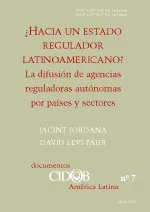¿Hacia un Estado regulador latinoamericano? La difusión de agencias reguladoras autónomas por países y sectores

Documentos CIDOB América Latina, n.º 7
Investigación en la cual desde un doble enfoque –por sectores y por países– se profundiza en la comprensión del proceso de transformación del Estado en América Latina marcado, a partir de 1990, por un crecimiento espectacular del número de instituciones reguladoras autónomas en la región. Los autores de este ensayo consideran que la creación de autoridades reguladoras es el sello distintivo de la transformación del Estado como proveedor de servicios, en un Estado regulador y, en términos más generales, como muestra de la configuración de un nuevo orden de capitalismo regulador. En un repaso por sectores, definen el sistema bancario central como pionero de esta tendencia, seguido por otros sectores que tienen actualmente su ejemplo más claro en el campo de las telecomunicaciones. De acuerdo con un análisis comparativo en términos de la dinámica de las reformas en Europa, se subraya que mientras las tasas de difusión en esferas de regulación económica son similares en ambas regiones, respecto a la regulación social, se han establecido aproximadamente el doble de agencias en Europa que en América Latina. Según los analistas, el estudio de la difusión de agencias reguladoras en otros sectores como el medio ambiente, los servicios postales, la producción farmacéutica y la seguridad alimenticia será uno de los aspectos que planteará más desafíos en la acción estatal y el proceso de difusión durante los próximos diez años.
Jacint Jordana es catedrático de Ciencia Política en el Departamento de Ciencias Políticas y Sociales de la Universitat Pompeu Fabra (UPF).
David Levi-Faur es senior lecturer, School of Political Science, University of Haifa, Israel.
ISSN: 1697-7688 (ed. impresa)
ISSN: 1697-8137 (ed. en línea)
52 pág.